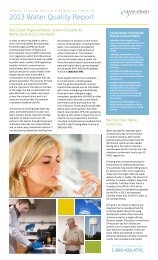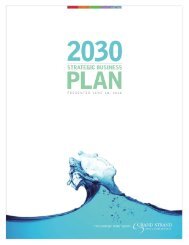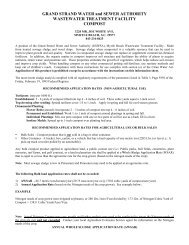Emergency Plan - Grand Strand Water and Sewer Authority
Emergency Plan - Grand Strand Water and Sewer Authority
Emergency Plan - Grand Strand Water and Sewer Authority
You also want an ePaper? Increase the reach of your titles
YUMPU automatically turns print PDFs into web optimized ePapers that Google loves.
APPENDIX 13<br />
PRESS RELEASES<br />
5.12 Press Releases<br />
NEWS<br />
For more information contact:<br />
Fred Richardson (CEO) – 843-443-8221<br />
<strong>Emergency</strong> number – 843-***-****<br />
<strong>Plan</strong> Now for Household <strong>Water</strong> Safety<br />
Important Steps Before Hurricane Approaches<br />
GSWSA ** Conway, S.C. - - dateline here - - Local residents are urged to implement a<br />
household water safety plan as Hurricane _________________________ approaches the<br />
Carolina coast.<br />
“Every household needs a detailed plan to ensure safety <strong>and</strong> that plan should begin with clean<br />
water,” said Fred Richardson, GSWSA CEO. “We urge customers to conserve water uses<br />
immediately after a storm. This helps reduce the impact on our water <strong>and</strong> wastewater systems <strong>and</strong><br />
will give us time to get our entire system back in order.”<br />
Here’s a quick look at planning tips you may find helpful:<br />
<strong>Water</strong> Storage<br />
Store regular tap water in half-gallon or one gallon containers, preferably made of heavy plastic<br />
with screw caps such as soft drink containers. Fill containers completely. DO NOT USE<br />
DISCARDED PLASTIC MILK CONTAINERS because they do not seal well. Mark containers<br />
with current date, discard within six months.<br />
The average household should have one gallon of water per person per day for cooking <strong>and</strong><br />
drinking. You should keep at least a three day supply.<br />
To increase shelf life of water, store bottles in dark plastic trash bags to keep out light.<br />
Containers stored for more than six months should be checked for leaks or any other undesirable<br />
conditions that may have developed.<br />
Bottled water (water purchased in a store) does not keep as well as normal tap water. Tap water<br />
contains disinfectants to guard against microbe growth.<br />
Store volume water needs (for flushing toilets, cleaning, etc.) in the bathtub <strong>and</strong> other large<br />
containers.<br />
Shut Off <strong>Water</strong> to Your Home<br />
Shut off the water valve at your home’s shut-off valve or at the water meter. The shut-off valve<br />
should be located near the main water line’s entrance to your home. Shutting off the water<br />
prevents potential contaminants from entering your plumbing system in the event water lines are<br />
broken.<br />
When shutting off your home’s water supply, also remember to turn off your hot water heater.<br />
The water heater could be damaged without a steady water supply.<br />
How to Purify <strong>Water</strong><br />
Monitor media reports immediately after a storm for boil water advisories affecting GSWSA<br />
customers.






